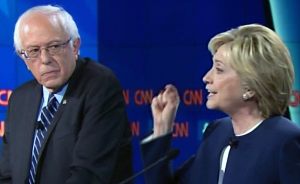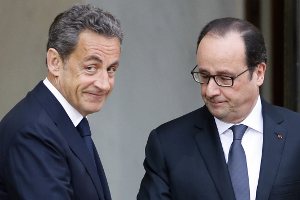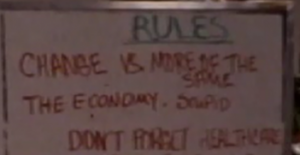One of the great advantages of living outside the United States, as I do, is attaining a certain distance from American pop culture. This can also be a disadvantage, especially at dinner parties, when I’m forced to admit that I’ve never heard of, say, Kim Kardashian.
The trade-offs are worth it. And Twitter educates me on the Kardashians.
American politics
So, Iowa has held its caucuses, and New Hampshire is next. Bernie Sanders did better than I expected, but Iowa is a friendly state to him because of its electoral system, where Democrats vote publicly, not privately. It’s a different dynamic when everyone knows who you’ve voted for (just ask any union member). Peer pressure becomes a major factor — absent when you have a secret ballot. So I predicted that he’d do relatively well in Iowa, and in New Hampshire, his neighboring state.

That’s bad news for Hillary Clinton, because momentum is a real force in politics. Someone pointed out to me the other day that in 2007, many people said they liked Barack Obama but wouldn’t vote for him because he wasn’t a viable candidate. Iowa changed that perspective. I expect the same to happen with a lot of people who privately “feel the Bern” but put aside the idea of voting for him because his candidacy would be hopeless.
One thing that has surprised me is the stridency of both sides. Ronald Reagan had it right: his Eleventh Commandment was never to speak ill of a fellow party member. The Democratic camps need to save their nastiness for the Republican nominee.
I’m surprised at how well Marco Rubio performed among Iowa Republicans, who unlike the Democrats have a secret ballot.I expect that the G.O.P. might well nominate him, given that he’s telegenic and lacks the extremely negative ratings of Donald Trump, and the moderately worse negatives for Ted Cruz. Rubio could be a formidable adversary for either Clinton or Sanders.
Then, of course, there’s always Michael Bloomberg waiting in the wings to spend a billion or so on himself while bypassing the little people whom the rest of the politicians are courting. Let them eat cake! And speaking of the French …
French politics
Polling experts in the United States have consistently shown that negative ratings are very difficult to overcome, while positive ratings are fickle. That’s why Trump would be a disaster for the Republicans. And why the French Republicans are worried about the comeback efforts of Nicolas Sarkozy.

Sarko, as the French generally refer to him, had very negative ratings toward the end of his presidency, which lasted from 2007 to 2012. He was the first president to be turned out of office while seeking a second term. His successor, François Hollande, of the Socialist Party, has managed to score even lower. His consistent move to the right has alienated his base while attracting little support from the center. The Republicans (as the rightists now call themselves) are happy to leave him hoist with his own petard until the elections in 2017.
It’s no surprise that the left intensely dislikes Sarko. What’s more interesting is the reaction on the right to his comeback. He is currently all over the airwaves with the release of a book, “La France pour la vie” (“France for Life”), under his name. (I leave it to others to decide how much of it was ghostwritten.) Yet recent polls indicate that the French would like pretty much anyone but Hollande and Sarkozy as the candidates of their respective parties.
The stench of petty corruption was so widespread during the Sarkozy era (investigations abound) that Republicans even long for Alain Juppé, a former prime minister who was actually convicted of corruption.
Among the Socialists (not a dirty word in France; they’re the mainstream party on the left), the current prime minister, Manuel Valls, and economy minister, Emmanuel Macron, are ahead of Hollande in the polls, but it’s a long way till Election Day. The only route to re-election for the current president, it seems, would be a rebound in the economy. The French, like the Americans, vote their pocketbooks.

Or as James Carville so elegantly put it in 1992, while campaigning for another Clinton: It’s “the economy, stupid.”
On verra (we shall see).